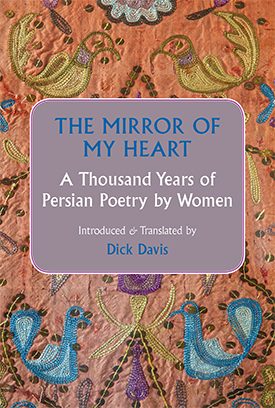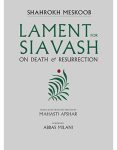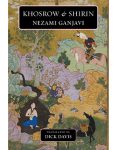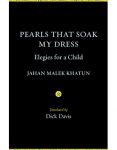About the Book
I gaze into the mirror of my heart, /And though it’s me who looks, it’s you I see. So speaks one of the many distinctive voices in this new anthology of verse by women poets writing in Persian, most of whom have never been translated into English before; this is especially true of the pre-modern poets, such as the unnamed author of the lines above, known simply as the “daughter of Salar” or “the woman from Esfahan.”
One of the very first Persian poets was a woman (Rabe’eh, who lived over a thousand years ago) and there have been women poets writing in Persian in virtually every generation since that time until the present. Before the twentieth century they tended to come from society’s social extremes. Many were princesses, a good number were hired entertainers of one kind or another, and they were active in many different countries – Iran of course, but also India, Afghanistan, and areas of central Asia that are now Uzbekistan, Turkmenistan, and Tajikistan. Not surprisingly, a lot of their poetry sounds like that of their male counterparts, but a lot doesn’t; there are distinctively bawdy and flirtatious poems by medieval women poets, poems from virtually every era in which the poet complains about her husband (sometimes light-heartedly, sometimes with poignant seriousness), touching poems on the death of a child, and many epigrams centered on little details that bring a life from hundreds of years ago vividly before our eyes.
In the nineteenth century we begin to see political poems, often very angry ones, by women demanding both the independence of Middle-Eastern countries from Western governments and women’s emancipation.Perhaps the most personal and intensely emotional poems are those of the last hundred years, in which we see local sensibilities rooted in a millennium of literary and social tradition responding to, and embracing or rejecting, the myriad multi-cultural strands that make up the modern world.
The Mirror of My Heart is a unique and captivating collection introduced and translated by Dick Davis, an acclaimed scholar and translator of Persian literature as well as a gifted poet in his own right. In his introduction he provides fascinating background detail on Persian poetry written by women through the ages, including common themes and motifs and a brief overview of Iranian history showing how women poets have been affected by the changing dynasties. From Rabe’eh in the tenth century to Fatemeh Ekhtesari in the twenty-first, each of the eighty-three poets in this volume is introduced in a short biographical note, while explanatory notes give further insight into the poems themselves.
Reviews
The Washington Post
From the Washington Post, Oct 23, 2019
At last, we hear the beautiful — and sometimes bawdy — Persian poems by women
By
Sappho, Ono no Komachi, Louise Labé, Emily Dickinson, Christina Rossetti, Charlotte Mew — these are among the pre-20th-century female poets that all the world honors and reveres. By contrast, in “The Mirror of My Heart: A Thousand Years of Persian Poetry by Women” some of the most striking writers are essentially anonymous, being identified only as the daughter, wife, sister or mother of a king, courtier or merchant.
Is this a reflection, then, of the secondary status of women in ancient Iran, Afghanistan and western India, the principal areas where Persian has been spoken and written? In part, yes. But as Dick Davis reminds us in his book’s 60-page introduction, until recently women in that part of the world were considered strictly amateur, not professional, poets. Unlike a Hafez or Rumi, they weren’t involved in what our own contemporaries call po-biz. They didn’t live off the largesse of royal patrons or recite their work in bazaars. These educated wives and daughters read and composed poetry because it enriched their lives.
In general, the lyrics chosen by Davis, especially those from before the 1800s, are short, intimate and usually addressed to one person or a small circle of friends. In some cases, the poems express what seem to be truly personal cris de coeur, even if the imagery employed — gardens, the breeze at dawn, tears, wine and roses — is as conventional as that found in a Petrarchan sonnet or a Japanese haiku. As with so much confessional poetry, old or new, the eternal themes are love, longing, loneliness and loss.
One might add lasciviousness to that list of L’s. During several easygoing regimes, the court women — especially in the 16th century — could be astonishingly forthright, even bawdy. Their poems recall nights of adulterous passion, hint at same-sex desires, complain about the impotence of elderly husbands. Their words leave nothing veiled, as in this four-line outburst by the 15th-century Mehri, “an answer to an old man who proposed himself as her lover”:
Good God, what do you think my flesh is? What?
It’s handsome men I fancy, young and hot!
If I liked weak old men, why would I whine
About the one that I’ve already got?
A daughter of the Moghul emperor Babur, Golbadan Beigum (1523-1603) sounds as cheekily epigrammatic as Dorothy Parker: Be sure that girls who treat their lovers badly/Are apt to find their lives will end up sadly.
Then there’s the 14th-century princess Jahan Malek Khatun, whose work Davis previously introduced in “Faces of Love: Hafez and the Poets of Shiraz”:
I swore I’d never look at him again,
I’d be a Sufi, deaf to sin’s temptations;
I saw my nature wouldn’t stand for it—
From now on I renounce renunciations.
At several times, alas, greater Persia reverted to extreme Islamic austerity. Girls were then kept illiterate, married off at 15 to men three times their age and forced to hide their faces in public. Eventually, regime change led to the lessening of some restrictions, so that the early 19th-century poet Mastureh Kurdi can brassily write: “I’d give the world’s wealth for a drop of wine — / I’d give both worlds, and throw in Judgment Day.” A poem by one of her contemporaries named Gowhar spins variations on the leitmotif phrase “last night.” It ends: “Gowhar, he gave your heart’s desire and took your soul—/My love can’t say the bargain wasn’t fair, last night.” Yet another poet of the same period, Gowhar Beigum Azerbaijani, neatly summarizes her impressive erotic power: “One glance of mine will make two hundred men/ Whom death has taken, come to life again.”
By the 20th century, Iranian women — like women in the West — began to demand greater freedoms. Called her country’s first feminist poet, Alam Taj lived from 1883 to 1947 and composed her poems in secret; they were only discovered after her death. In one, she describes her loathed husband’s whiskers against her skin as feeling, in a highly surrealistic image, “like a tiny knife inserted in an eyeball’s pupil.”
Today, some of Iran’s more outspoken poets have gone into exile. Others, like Simin Behbahani, have been prevented from leaving the country. Twice nominated for the Nobel Prize, Behbahani — who died in 2014 — is here represented by six poems, starting with “Prostitute’s Song,” which details the horrors of that life. Attention-grabbing in a different way, Sara Ardehali launches “A Full-Time Position” with distinctly comic understatement: “No man wants/ to fall in love with a woman/ Who works in a circus.” The very last poet represented, Fatemeh Ekhtesari, was born in 1986 and she’s anything but modest and retiring:
I was knocked up and made pregnant
By a right-wing political bore
When the dust had settled he’d left me
As if I were a whore.
As well as being an admired poet in his own right, Dick Davis is widely regarded as our leading translator from Persian. Every page of “The Mirror of My Heart” shows why, whether through the limpid beauty of the poems themselves or in his command of a diction that ranges from the elegant to the slangy, One poem, by the late 18th-century Maluli, slowly drains all the country-and-western heartbreak from the refrain, “What’s it to you?”When Kasma’i (1883-1923) laments the subordinate condition of women in Iran and her country’s subjection to the West, Davis translates: “Iran is famous in the world for her nobility — / It’s this that makes me think, and gives me hope, and troubles me.” That couplet may seem artlessly catchy, but its cadence must have taken immense patience to get just right.
In every respect, “The Mirror of My Heart” is outstanding. Reading it one discovers a whole tradition of love poetry, epigram and elegy, movingly brought into English and then beautifully printed and bound by Washington’s own Mage Publishers. Most important now, this anthology reminds us how much we all share the same joys, the same sorrows.
Publishers Weekly
Davis, a poet, scholar, and translator of Persian literature, delivers an anthology that provides ample context for readers looking to explore Persian poetry written by women from the Middle Ages to the present. “A significant feature of Persian poetry,” Davis writes, “that distinguishes it from most verse written in European language is that almost all of it—from the earliest poems, to the present day—remains relatively accessible to a contemporary speaker.” Among the contemporary poets included in the anthology is Pegah Ahmadi (born in 1974), an Iranian political refugee and one of the translators of Sylvia Plath into Persian. “Why in the depths of no-progress is nothing moving?” she asks in an untitled poem. “Language is a cutting off of terror/ look, blood doesn’t flow from the wrist,/ and neither does it clot/ and I, whose eye was an open history of intensity,/ throw a razor into the abyss.” With its subtle, comprehensive history of how female poets have responded to political upheaval throughout the centuries, this work provides readers with a thoughtful and thorough introduction to Persian poetry, and the important role that women have played in shaping it. (Oct.)
Reviewed on : 10/17/2019
Release date: 10/01/2019
Genre: Poetry
Contents
Introduction xi
The Medieval Period xx
From 1500 to the 1800s xxx
From the 1800s to the Present xxxviii
Selecting the Poems in this Volume lviii
Translator’s Note lxviii
A Note on the Sources lxix
Acknowledgments lxxiii
A Note on Iranian Dynasties lxxiv
Map Showing the Places Mentioned in the Book lxxvi
The Medieval Period 1
From 1500 to the 1800s 53
From the 1800s to the Present 107
Notes 238
THE POETS
The Medieval Period
Rabe’eh, 3
Mahsati, 7
Anonymous, 15
Motrebeh, 16
Daughter of Salar, 17
Aysheh Samarqandi, 18
Fatemeh Khorasani, 20
Padshah Khatun, 21
Delshad Khatun, 23
Jahan Malek Khatun, 24
Mehri, 43
Atuni, 48
Zaifi Samarqandi, 50
Ofaq Jalayer, 51
From 1500 to the 1800s
Pari Khan Khanom, 55
Dusti, 57
Golchehreh Beigum, 58
Golbadan Beigum, 59
Bija Shahi, 60
Bija Nehani Qa’emi, 61
Tuni, 62
Bibi Mah Ofaq, 63
Hejabi, 64
Jamileh Esfahani, 65
Nehani Shirazi, 66
Nur Jahan, 67
Makhfi, 70
Zinat al-Nissa Beigum, 76
Soltan Daghestani, 77
Agha Beigum, 78
Hayati, 79
Aysheh Afghani, 80
Reshheh, 83
Maluli, 86
Effat, 89
Agha Baji, 90
Qamar Qajar, 91
Esmat Khanom, 92
Jahan Khanom, 93
Efaf, 94
Fakhri, 95
Mariam Khanom, 96
Mastureh Kurdi, 97
Mastureh Guri, 104
Shah Jahan Beigum of Bhopal, 105
Baligheh-ye Shirazi, 106
From the 1800s to the Present
Tahereh, 109
Shahdokht, 114
Soltan, 115
Gowhar, 116
Gowhar Beigum Azerbaijani, 118
Shahin Farahani, 119
Makhfi-ye Badakhshi, 120
Farkhondeh Savji, 121
Jannat, 122
Kasma’i, 126
Nimtaj Salmasi, 128
Alam Taj, 129
Zinat Amin, 140
Batul Adib Soltani, 142
Parvin Etesami, 143
Zhaleh Esfahani, 155
Simin Behbahani, 164
Lobat Vala, 174
Forugh Farrokhzad, 179
Tahereh Saffarzadeh, 189
Mina Assadi, 192
Nazanin Nezam Shahidi, 195
Fevzieh Rahgozar Barlas, 197
Soheila Amirsoleimani, 199
Farzaneh Khojandi, 201
Azita Ghahreman, 202
Parween Pazhwak, 204
Khaledeh Forugh, 207
Mandana Zandian, 210
Mana Aqai, 212
Pegah Ahmadi, 214
Granaz Moussavi, 216
Sara Ardehali, 219
Shabnam Azar, 224
Rosa Jamali, 226
Hengameh Hoveyda, 229
Fatemeh Shams, 230
Fatemeh Ekhtesari, 234
About the Author
Dick Davis brings a unique array of gifts to the challenges of translating Hafez and his contemporaries. In his own right, he is a poet of great technical accomplishment and emotional depth. He is also the foremost English-speaking scholar of medieval Persian poetry now working in the West. Numerous honors testify to his talents. In the U.K., he received the Royal Society of Literature’s Heinemann Award for his second book of poems, Seeing the World, in 1981; his Selected Poems was chosen by both the Sunday Times and the Daily Telegraph as a Book of the Year in 1989; and his collection Belonging was selected as the Poetry Book of the Year by The Economist in 2003. In the U.S., A Kind of Love—the American edition of his Selected Poems—received the Ingram Merrill prize for “excellence in poetry” in 1993. He has received awards for his scholarship from the Arts Council of Great Britain, The British Institute of Persian Studies, and the Guggenheim Foundation, and he is the recipient of grants for his translations from the National Endowment for the Humanities and the National Endowment for the Arts. Twice, in 2000 and 2001, he received the Translation Award of the International Society for Iranian Studies, and in 2001 he received an Encyclopedia Iranica award for “services to Persian poetry.” His translation of Ferdowsi’s Shahnameh: the Persian Book of Kings was chosen as one of the “ten best books of 2006” by the Washington Post.
Davis read English at Cambridge, lived in Iran for eight years (he met and married his Iranian wife Afkham Darbandi there), then completed a PhD in Medieval Persian Literature at the University of Manchester. He has resided for extended periods in both Greece and Italy (his translations include works from Italian), and has taught at both the University of California and at Ohio State University, where he was for nine years Professor of Persian and Chair of the Department of Near Eastern Languages, retiring from that position in 2012. In all, he has published more than twenty books and is a Fellow of the Royal Society of Literature.
Among the qualities that distinguish his poetry and scholarship are exacting technical expertise and wide cultural sympathy—an ability to enter into distant cultural milieus both intellectually and emotionally. In choosing his volume of poems Belonging as a “Book of the Year” for 2006, The Economist praised it as “a profound and beautiful collection” that gave evidence of “a commitment to an ideal of civilized life shared by many cultures.” the Times Literary Supplement has called him “our finest translator of Persian poetry.” In 2009 Mage published a book of Dick Davis’s own poems about Iran: At Home and Far From Home: Poems on Iran and Persian Culture. His book about the Shahnameh, Epic and Sedition was published by Mage in paperback in 2006. His books of translations are: Borrowed Ware: Medieval Persian Epigrams (1998), The Shahnameh (2004); The Legend of Seyavash (2004); Rostam: Tales of Love and War from Persia’s Book of Kings (2007); Vis and Ramin (2008); Faces of Love: Hafez and the Poets of Shiraz (2012).








